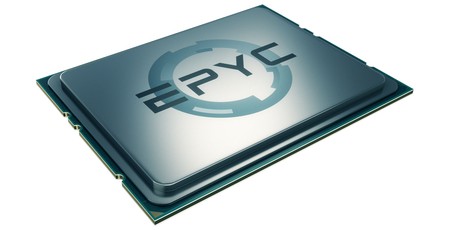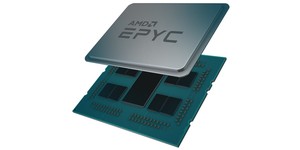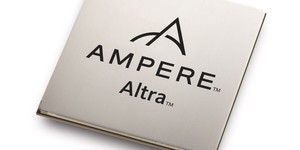AMD has officially launched its second-generation Epyc processors, based on the Zen 2 microarchitecture, boasting of a major client win in Google's Cloud Compute Engine - but Intel has fired back with a high-end many-core chip of its own.
Designed primarily for data centre use, though also present in the high-end workstation market, AMD's Epyc family of chips concentrate on single-socket many-core performance. Based on the same Zen 2 microarchitecture as the company's third-generation Ryzen processors, the second-generation Epyc chips are built on a 7nm process node and offer a claimed 23 percent instructions per clock (IPC) uptick per core compared to the company's first-generation parts.
The initial line-up of second-generation Epyc chips begins with the entry-level 7232P, a $450-in-quantity single-socket chip packing eight cores and 16 threads (8C16T) at a 3.1GHz base and barely-higher 3.2GHz boost frequency alongside 32MB of Level 3 (L3) cache in a 120W thermal design profile (TDP). For those building a dual-socket system, the 8252 offers the same cores but an increased 64MB of L3 cache for $475. As the range increases, so do the specifications: The 7272 offers 12 cores and 24 threads (16C24T) at 2.9GHz base and 3.2GHz clock with 64MB of L3 cache and the same 120W TDP; the 7282 increases that to 16 cores and 32 threads (16C32T) at 2.8GHz based and 3.2GHz clock; the single-socket and dual-socket 7302P and 7302 both offer 16 cores and 32 threads at 3GHz base and 3.3GHz boost plus 128MB of L3 cache, but at an increased 155W TDP; those who need more cores in the same power envelope, meanwhile, can opt for the 7352 which has 24 cores and 48 threads (24C48T) at 2.3GHz base and 3.2GHz boost.
From here, the specifications continue to increase: The 7452 offers 32 cores and 64 threads (32C64T) at 2.35GHz base and 3.35GHz boost in a 155W TDP; the 7402 and 7402P have 24 cores and 48 threads (24C48T) at 2.8GHz base and 3.35GHz boost but demand a 180W TDP; the 7542 32-core 64-thread (32C64T) is the first part to hit a 225W TDP with the promise of 2.9GHz base and 3.3GHz boost clocks, while the 7552 ups the ante with 48 cores and 96 threads (48C96T) at 2.2GHz base, 3.3GHz boost and a whopping 192MB of L3 cache. Those who need yet more performance have the option of the 7642 48-core 96-thread (48C96T) 2.3GHz/3.3GHz part with 256MB of L3 cache in a 225 TDP, while the 7702 and 7702P offer dual- and single-socket system builders 64 cores and 128 threads (64C128T) at 2GHz base and 3.35GHz boost at an impressive 200W TDP.
The range finishes, finally, with the Epyc 7742, a 64-core 128-thread (64C128T) part which hits a 225W TDP to increase the clocks to 2.25GHz base and 3.4GHz boost. That extra hit of performance doesn't come cheap, however: Based on one-thousand-unit tray pricing, the 7742 costs $6,950 - the most expensive chip in the range, but a considerable discount over Intel's closest competing part.
'Today, we set a new standard for the modern data centre with the launch of our 2nd Gen AMD Epyc processors that deliver record-setting performance and significantly lower total cost of ownership across a broad set of workloads,' claims Dr. Lisa Su, president and chief executive of AMD. 'Adoption of our new leadership server processors is accelerating with multiple new enterprise, cloud and HPC customers choosing Epyc processors to meet their most demanding server computing needs.'
That adoption can be tracked, too: Google has confirmed it plans to adopt second-generation Epyc for its Cloud Compute Engine, while social networking service Twitter claims that switching to Epyc has cut its total cost of ownership (TCO) by 25 percent. Hewlett Packard Enterprise (HPE), Lenovo, and Dell have also confirmed their support for the parts, while Cray is building a supercomputer based on the new chips for the US Air Force Weather Agency.
Intel, however, is not resting on its laurels. Just ahead of AMD's unveiling the company announced its Cooper Lake Xeon Scalable processor range, which will top out at 56 cores and 112 threads (56C112T) but which will offer integrated hardware for accelerating artificial intelligence training workloads - namely Intel's Deep Learning Boost (DL Boost) technology, including the newly-added bfloat16 type support. Those investing in Cooper Lake systems will be able to install the upcoming 10nm Ice Lake Xeon parts as drop-in upgrades, too, but there's a catch: Cooper Lake won't be commercially available until the first half of 2020.
More information on AMD's second-generation Epyc parts can be found on the company's official website.

MSI MPG Velox 100R Chassis Review
October 14 2021 | 15:04









Want to comment? Please log in.